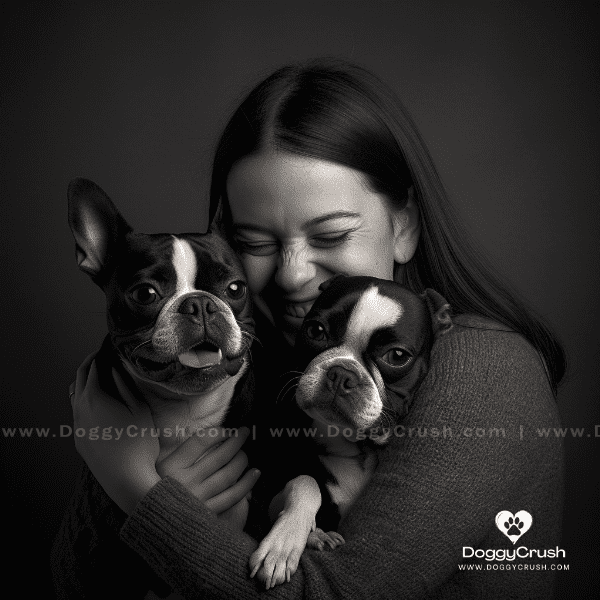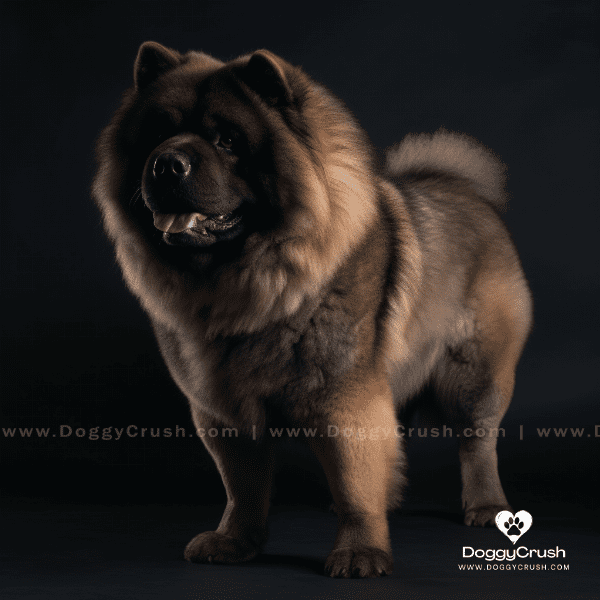Table of Contents
- History and Origin of the Boston Terrier
- Physical Characteristics of Boston Terrier Dogs
- Temperament and Personality Traits of Boston Terriers
- Training Your Boston Terrier: Tips and Tricks
- Feeding Your Boston Terrier: Nutrition and Diet Recommendations
- Exercise Needs of Boston Terrier Dogs
- Grooming Your Boston Terrier: Coat Care and Maintenance
- Common Health Issues and Concerns for Boston Terriers
- Choosing the Right Boston Terrier for Your Family
- Boston Terrier Rescue and Adoption: What You Need to Know
History and Origin of the Boston Terrier
The Boston Terrier is a breed that originated in the United States in the late 1800s. This small dog was created by crossing the English Bulldog with the now extinct white English Terrier. The original Boston Terriers were larger and more muscular than the Boston Terriers of today.
Development of the Boston Terrier Breed
The Boston Terrier was first bred in Boston, Massachusetts, in the late 1800s. The breed was developed for the purpose of being a companion dog, and it quickly became a popular choice among city dwellers.
The early Boston Terriers were known as the “roundheads” because of their round skull shape. They were also called “American Bull Terriers” and “Boston Bulls.” It wasn’t until 1891 that the breed was officially recognized by the American Kennel Club as the Boston Terrier.
Boston Terriers in Pop Culture
The Boston Terrier has been a popular breed in pop culture throughout the years. In the early 1900s, the Boston Terrier was used in advertisements for products such as Coca-Cola and Pabst Blue Ribbon beer. The breed has also been featured in movies, TV shows, and books.
One of the most famous Boston Terriers was named “Higgins,” who played “Dog” on the TV show Petticoat Junction in the 1960s. The breed is also featured in the movies “As Good as It Gets” and “Due Date.”
Evolution of the Boston Terrier Breed
The Boston Terrier breed has evolved over the years. In the early 1900s, the breed was larger and more muscular. Today, the breed is smaller and more compact. The original color of the Boston Terrier was brindle, but today the breed comes in a variety of colors, including black, seal, and brindle.
The Boston Terrier is a beloved breed that has a rich history in the United States. From its early beginnings in Boston to its appearance in pop culture, this breed has captured the hearts of many.

Physical Characteristics of Boston Terrier Dogs
The Boston Terrier is a small, muscular, and compact breed. They are known for their distinct black and white coat coloration and their unique facial structure. Here are some key physical characteristics of Boston Terrier dogs:
Size and Weight
Boston Terriers are a small breed, typically weighing between 10 and 25 pounds. They stand at a height of around 15 to 17 inches at the shoulder. Despite their small size, Boston Terriers are surprisingly muscular and have a stocky build.
Coat and Coloration
The Boston Terrier has a short, smooth coat that is easy to maintain. The breed’s coat comes in a variety of colors, including black, seal, and brindle. The breed’s distinct black and white coat coloration is a defining characteristic of the Boston Terrier.
Unique Facial Structure
The Boston Terrier’s facial structure is one of its most unique features. The breed has a short, square-shaped muzzle and large, expressive eyes. The Boston Terrier’s ears are small and stand upright. The breed’s overall facial structure gives them a distinctive, almost comical appearance.
Tail and Limbs
The Boston Terrier has a short, stubby tail that is usually carried low. The breed’s limbs are straight and muscular, with compact feet and well-arched toes.
Overall Appearance
Overall, the Boston Terrier is a compact and muscular breed with a distinctive black and white coat coloration and unique facial structure. Their small size and stocky build make them a popular choice for city dwellers and those who live in apartments. Despite their small stature, Boston Terriers are known for their lively and energetic personalities.
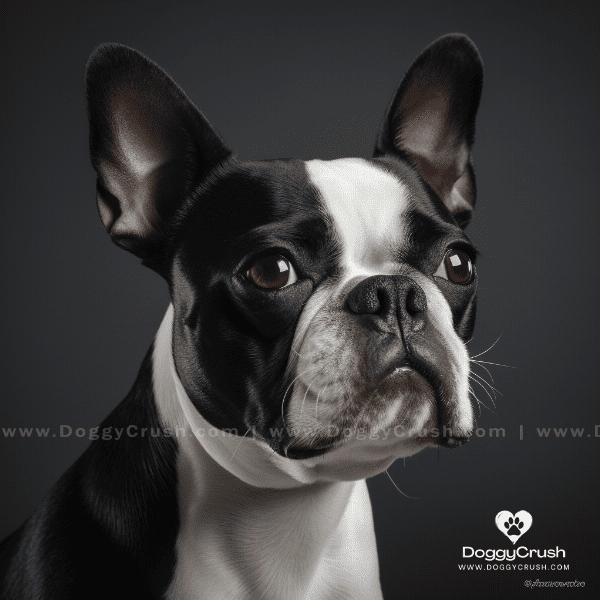
Temperament and Personality Traits of Boston Terriers
Boston Terriers are known for their lively and friendly personalities. They are a highly intelligent breed that loves to be around people. Here are some key temperament and personality traits of Boston Terriers:
Friendly and Affectionate
Boston Terriers are known for their friendly and affectionate personalities. They love to be around people and thrive on attention and affection. They are often described as “people dogs” and make excellent family pets.
Intelligent and Trainable
Boston Terriers are a highly intelligent breed that is easy to train. They are eager to please their owners and respond well to positive reinforcement training methods. They excel in obedience training and agility competitions.
Playful and Energetic
Boston Terriers are a playful and energetic breed that loves to have fun. They are always up for a game of fetch or a walk in the park. Despite their small size, Boston Terriers are surprisingly active and require daily exercise to stay healthy and happy.
Alert and Protective
Boston Terriers are known for their alertness and protective nature. They make excellent watchdogs and will bark to alert their owners of any potential danger. However, they are not aggressive and are typically friendly towards strangers.
Affectionate with Children
Boston Terriers are a great choice for families with children. They are affectionate and patient with kids and love to play. However, like any breed, it’s important to supervise interactions between young children and dogs to ensure everyone’s safety.
Overall, Boston Terriers are a highly sociable and friendly breed that makes an excellent family pet. They are intelligent, trainable, and love to have fun. Their lively personalities and unique facial structure make them a popular choice among dog lovers.
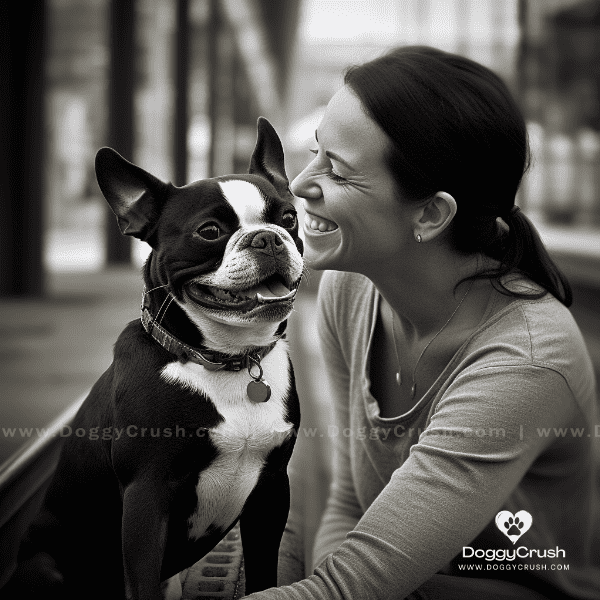
Training Your Boston Terrier: Tips and Tricks
Boston Terriers are a highly trainable breed that responds well to positive reinforcement training methods. Here are some tips and tricks for training your Boston Terrier:
Start Early
It’s important to start training your Boston Terrier as early as possible. Begin with basic obedience training, such as teaching them to sit, stay, and come when called. Consistency is key, so be sure to use the same commands and rewards every time you train your dog.
Use Positive Reinforcement
Boston Terriers respond well to positive reinforcement training methods. Reward your dog with treats, praise, and affection when they exhibit the desired behavior. Avoid using punishment or harsh training methods, as this can lead to fear and anxiety in your dog.
Socialize Your Dog
Socialization is important for all dogs, but especially for breeds like the Boston Terrier, who can be prone to separation anxiety. Introduce your dog to new people, places, and experiences from an early age to help them develop confidence and reduce anxiety.
Exercise Your Dog
Boston Terriers are an energetic breed that requires daily exercise to stay healthy and happy. A daily walk or playtime in the backyard can help burn off excess energy and prevent destructive behavior.
Be Patient
Training your Boston Terrier takes time and patience. Don’t expect your dog to learn everything overnight. Consistent, positive training over time will help your dog develop good habits and behavior.
Seek Professional Help if Needed
If you are having difficulty training your Boston Terrier, seek professional help from a qualified dog trainer or behaviorist. They can help identify any issues and develop a customized training plan for your dog.
By following these tips and tricks, you can help your Boston Terrier become a well-trained and well-behaved companion. Remember to be patient and consistent, and always use positive reinforcement training methods.
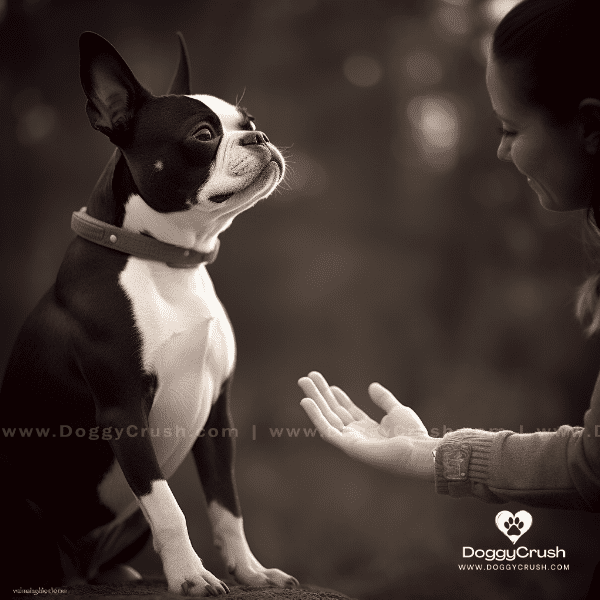
Feeding Your Boston Terrier: Nutrition and Diet Recommendations
Feeding your Boston Terrier a balanced and nutritious diet is essential for their overall health and well-being. Here are some nutrition and diet recommendations for Boston Terrier dogs:
Choose a High-Quality Dog Food
Selecting a high-quality dog food is crucial for your Boston Terrier’s health. Look for a dog food that lists a quality source of protein as the first ingredient, such as chicken, turkey, or fish. Avoid dog foods that contain fillers, by-products, or artificial preservatives.
Consider Your Boston Terrier’s Age and Activity Level
Your Boston Terrier’s age and activity level will influence their dietary needs. Puppies and active adult dogs require more calories and nutrients than senior dogs or those with a sedentary lifestyle. Consult with your veterinarian to determine the appropriate type and amount of food for your Boston Terrier.
Monitor Portion Sizes
Overfeeding can lead to obesity and other health problems in Boston Terriers. It’s important to monitor portion sizes and avoid free-feeding. Splitting their meals into two or three smaller meals throughout the day can also help prevent overeating.
Avoid Table Scraps and Human Foods
Table scraps and human foods can be harmful to your Boston Terrier’s health. Many human foods are high in fat, salt, and other ingredients that can lead to digestive issues or other health problems. Stick to a high-quality dog food that meets your dog’s nutritional needs.
Provide Fresh Water
Always make sure your Boston Terrier has access to fresh, clean water. Change their water bowl regularly and ensure that it is easily accessible to your dog.
By following these nutrition and diet recommendations, you can help ensure that your Boston Terrier stays healthy and happy. Consult with your veterinarian for specific dietary recommendations based on your dog’s individual needs.

Exercise Needs of Boston Terrier Dogs
Despite their small size, Boston Terriers are a fairly active breed that require regular exercise to maintain their health and happiness. Here are some exercise needs and recommendations for Boston Terrier dogs:
Daily Walks
Boston Terriers benefit from daily walks to burn off excess energy and provide mental stimulation. Aim for at least 30 minutes of brisk walking each day. Consider using a harness instead of a collar to prevent respiratory issues.
Indoor Play
Boston Terriers can also benefit from indoor playtime, especially during inclement weather. Toys such as balls or puzzle games can provide mental stimulation and help your dog burn off energy.
Consider Dog Sports
Boston Terriers excel in a variety of dog sports, including agility, obedience, and rally. These activities can provide both physical and mental exercise for your dog.
Supervised Outdoor Play
Boston Terriers enjoy outdoor playtime, but it’s important to supervise them to prevent injury or accidents. Consider a fenced-in yard or outdoor playpen to provide a safe environment for your dog to play.
Avoid Overexertion
While Boston Terriers require exercise, they are also prone to overheating and respiratory issues. Avoid exercising your dog during the hottest parts of the day and monitor their breathing during exercise.
By providing regular exercise and playtime for your Boston Terrier, you can help keep them healthy and happy. Be sure to consult with your veterinarian to determine the appropriate level of exercise for your dog based on their age and activity level.
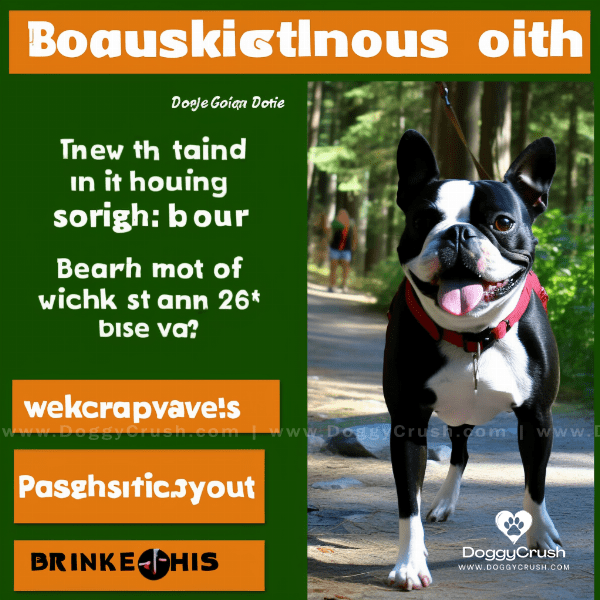
Grooming Your Boston Terrier: Coat Care and Maintenance
Boston Terriers have a short, smooth coat that is easy to maintain. However, regular grooming is still necessary to keep your dog looking and feeling their best. Here are some coat care and maintenance tips for grooming your Boston Terrier:
Brushing
Boston Terriers do not require extensive brushing, but regular brushing with a soft-bristled brush can help remove loose hair and dirt. This can also help distribute natural oils throughout the coat for a healthy shine.
Bathing
Boston Terriers only need to be bathed occasionally, usually every two to three months. Use a mild dog shampoo and avoid getting water in their ears. Be sure to rinse thoroughly to prevent skin irritation.
Nail Trimming
Regular nail trimming is important to prevent overgrowth and discomfort. Use a sharp nail trimmer and be careful not to cut the quick, which is a blood vessel that runs through the nail. If you are unsure, ask your veterinarian or groomer for assistance.
Teeth Cleaning
Dental hygiene is important for all dogs, including Boston Terriers. Regular teeth brushing with a dog-specific toothpaste can help prevent tooth decay and gum disease. Provide dental chews or toys to help remove tartar and promote healthy teeth.
Ear Cleaning
Boston Terriers are prone to ear infections, so regular ear cleaning is important. Use a dog-specific ear cleaner and cotton balls to gently clean the outer ear. Avoid inserting anything into the ear canal.
By following these coat care and maintenance tips, you can help keep your Boston Terrier looking and feeling their best. Regular grooming can also help identify any potential health issues, such as skin irritations or ear infections. Consult with your veterinarian or groomer for specific recommendations based on your dog’s individual needs.

Common Health Issues and Concerns for Boston Terriers
Like all Dog breeds, Boston Terriers are susceptible to certain health issues and concerns. Here are some of the most common health issues and concerns for Boston Terriers:
Brachycephalic Syndrome
Boston Terriers are a brachycephalic breed, which means they have a short, flattened muzzle. This can lead to respiratory issues, such as Brachycephalic Syndrome, which can cause difficulty breathing, coughing, and even collapse in severe cases.
Patellar Luxation
Patellar luxation is a common orthopedic issue in Boston Terriers. This occurs when the kneecap dislocates from its normal position, causing discomfort and difficulty walking.
Allergies
Boston Terriers can be prone to allergies, which can cause skin irritation, itching, and hair loss. Common allergens include pollen, dust, and certain foods.
Eye Issues
Boston Terriers are susceptible to several eye issues, such as cataracts, corneal ulcers, and cherry eye. Regular eye exams with a veterinarian can help identify and treat these issues.
Hip Dysplasia
Hip dysplasia is a common condition in many dog breeds, including Boston Terriers. This occurs when the hip joint does not develop properly, leading to discomfort and difficulty walking.
Obesity
Boston Terriers are prone to obesity, which can lead to several health issues such as joint problems, respiratory issues, and heart disease. Regular exercise and a balanced diet can help prevent obesity.
By being aware of these common health issues and concerns, you can take proactive steps to keep your Boston Terrier healthy and happy. Regular veterinary check-ups and early intervention can help prevent or treat these issues.
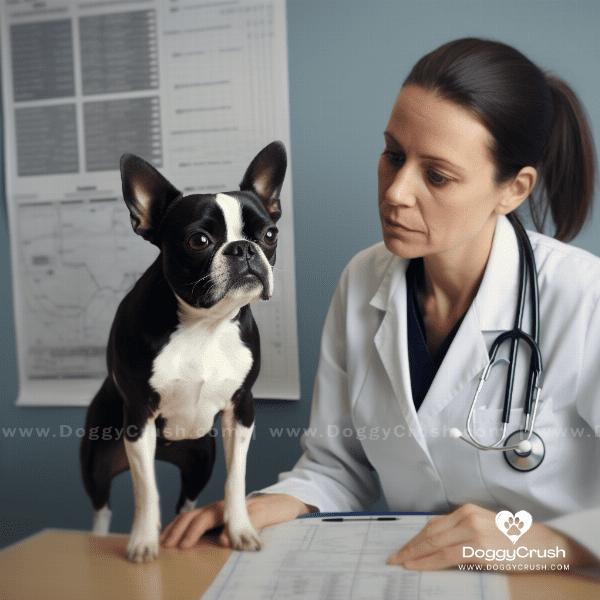
Choosing the Right Boston Terrier for Your Family
Choosing a Boston Terrier as a family pet can be a great decision, but it’s important to consider several factors before bringing a dog into your home. Here are some tips for choosing the right Boston Terrier for your family:
Consider Your Lifestyle
Before choosing a Boston Terrier, consider your lifestyle and living situation. Boston Terriers are an active breed that require regular exercise and mental stimulation. If you have a sedentary lifestyle or live in a small apartment, a Boston Terrier may not be the best fit.
Research Breeders
It’s important to find a reputable breeder when selecting a Boston Terrier. Look for a breeder who prioritizes the health and well-being of their dogs and is willing to provide health clearances and documentation.
Meet the Puppy’s Parents
Meeting the puppy’s parents can give you a good idea of the puppy’s temperament and personality. Look for dogs that are friendly, outgoing, and social.
Consider Temperament and Energy Level
Boston Terriers have a friendly and energetic temperament, but individual dogs can vary in their energy level and personality. Consider your family’s lifestyle and personality when selecting a Boston Terrier puppy.
.

Boston Terrier Rescue and Adoption: What You Need to Know
Adopting a Boston Terrier from a rescue or shelter can be a rewarding experience for both you and the dog. Here are some things to consider when adopting a Boston Terrier:
Advantages of Rescue and Adoption
Adopting a Boston Terrier from a rescue or shelter can be a great way to provide a loving home for a dog in need. Many rescue dogs have already received basic training and socialization, making them easier to integrate into your family. Adoption fees are also typically lower than purchasing a puppy from a breeder.
Research Rescue Organizations
Research local rescue organizations and shelters to find a Boston Terrier that fits your family’s needs. Look for reputable organizations that prioritize the health and well-being of their dogs.
Meet the Dog
Meeting the Boston Terrier in person is important to assess their personality and behavior. Consider bringing family members and any other pets to ensure compatibility.
Provide Proper Training and Care
Providing proper training and care is essential for any dog, but particularly important for rescue dogs. Be patient and consistent with training and provide plenty of love and attention to help your new furry friend feel secure in their new home.
By adopting a Boston Terrier from a rescue or shelter, you can provide a loving home for a dog in need. Remember that owning a dog is a lifelong commitment, so be sure you are ready to provide the love, care, and attention that your new furry friend deserves.
